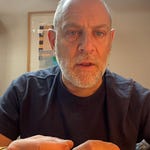Playback speed
×
Share post
Share post at current time
Share from 0:00
0:00
/
0:00
Transcript
Micah, Jonah and Margaret Mead
Weekly Video Recap of Below the Bible Belt
Feb 23, 2024
140 days into this brutal war we pause in pain, to seek solutions, help the healing, offer consolation, call for an urgent end to the violence and warfare towards long lasting peace. How do we get there? Perhaps the prophetic imagination can help ignite care, compassion, resilience and resources that we didn’t even know we have, deep within. Perhaps we can be all reminded to hurt and hate less, to hope and love more.
“The task of prophetic ministry is to nurture, nourish, and evoke a consciousness and perception alternative to the consciousness and perception of the dominant culture around us.”
These are the words of Walter Brueggemann, biblical scholar and author of “The Prophetic Imagination”, an excellent book that helps me make sense of all these prophets we are meeting here and what their ancient messages have to tell us right now.
This week below the bible belt, traveling with prophets, we witnessed Jonah’s successful campaign to change the minds of the greatest empire - and then his collapse and depression - whatever happens to justice and due punishment for evil when the evil doer repents? Is there no retribution? No reparations? Just forgiveness? Those big questions loom large still today even as we learn with Jonah that love can be a force that melts away the biggest rage and hurt and transforms trauma into healing. We leave Jonah sitting there mid dialogue with God and then we switched to Micah - pacing the pavements of Jerusalem with angry words towards the king and priests who keep abusing the poor, make immoral choices and risk destroying Judah and Jerusalem. Micah is the first historical voice, according to scholars, to actually name the impossible - Jerusalem will be a heap of ruins if they don’t change their ways - the temple and the palace, the Davidic empire - all of it - gone.
And did they listen? Was the dominant culture able to hear the truth that may save its future? Not then, and likely not now.
So what then is the use of the prophet? Why bother reading these failures that only remind us of how little words matter when money talks louder and fear based hatred defines policy - not kindness and love?
Because, as Bruggemann reminds us again and again — it is the prophetic imagination that is critical to give us hope and make sure we keep on fighting. Because some fights win and progress is real too. If slow, and even if it sometimes seems like we are sliding backwards. Yes Jerusalem was leveled to the ground as Micah said. And yes Assyria may have repented but it too became a heap of history.
But we, still here, have a chance of calling out, however we are able to, truth to power, justice and dignity, through our democratic system, with our right to free speech, in the name of what’s sacred and as loud as we can. What was it Margaret Mead said -
"Never doubt that a small group of thoughtful committed individuals can change the world. In fact, it's the only thing that ever has."
We continue next week with Micah, and then we’ll meet another prophet - Nahum - the one who brings comfort, at least by name.
Thank you for joining me to explore the power of the prophetic promise for a better day, chapter by chapter, below the Bible Belt.
hoping for healing, consolation and peace.
Recent Posts












Share this post